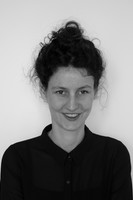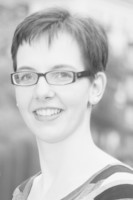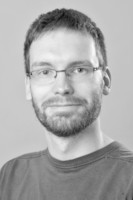Anna Georgiev
From 2006 to 2012, Anna Georgiev studied Cultural Sciences in a bachelor’s and Intercultural Communication in a master’s programme at the Europa-Universität Viadrina in Frankfurt (Oder). Various exchange programmes and working stays abroad brought her to Paris (2005), Sofia (2008), Haifa and Tel Aviv (2011-2013) and finally London (2013-2015). Most recently, she worked as a freelance cultural scientist in Berlin. Since February 2017, she has been a research associate and doctoral candidate at the Europäisches Kolleg in Jena.
Research project
Jewish Culture in Eastern German Museums (working title)
The museumisation of Jewish culture in Eastern Germany was not only influenced by politics and museum policies but also by a particular view on history (Geschichtskultur) in the former GDR. At the first glance, the perception of Jewish culture in GDR museums happened in comparison to the FRG relatively late and museumised synagogues were created mostly after the reunification of Germany.
Nevertheless, approaches to tackle this politically sensitive subject began long before that – shortly after the war Jewish cultural life became a prominent subject in a small regional museum in Gröbzig, present-day Saxony-Anhalt. This was to become the first and only Jewish museum in the country.
Despite the fact that Eastern German museums had contributed to West German exhibitions on Jewish topics through artefact loans from the 1960s, they generally did not yet raise the subject themselves. Only in the late 1970s did the main German historical museum – the Museum für Deutsche Geschichte - focus on the topic and finally, in 1988, the 50th commemoration of the November pogrom lead to a wide range of activities including the inauguration of exhibitions across the country.
So far, these museumisation processes have been discussed only marginally in scientific literature. In terms of a museological perspective, the historical analysis explores the extent to which curators of this day and age continue to be influenced by the museums' former handling of the subject.
Research interests
material oriented cultural science
museology
Jewish history and culture
Select publications
Thälmanns Turnhose und andere Dinge. Kurze Objektgeschichte antifaschistischer Ausstellungen der DDR, in: Deutschland-Archiv, 20.12.2019.
Jüdische Selbstbehauptung in Berlin. Die Geschichte der 500 Thorarollen, die die NS-Zeit in Berlin-Weißensee überdauerten, in:
Vierteljahreshefte für Zeitgeschichte 67(2019), 4, S. 537-563.
Zur materiellen Geschichte des 'Judensterns' 1941 bis 1945, in: Zeitschrift für Geschichtswissenschaft (66/2018), S. 623-639.
Zweimal getäuscht. Synagogenbilder am Museum für Deutsche Geschichte, in: Mitgliederrundbrief, Aktives Museum, Faschismus und Widerstand in Berlin e.V. (79/2018), S. 23-27.
Jüdische Perspektiven, in: 'Das andere Deutschland'. Festschrift 70 Jahre Berliner VVV (01/2018), S. 8f.
(with Markus Wegewitz) Tagungsbericht. Rescue of Jews during the Second World War in Contemporary Museums, 05.10.2017 – 06.10.2017 Berlin, in: H-Soz-Kult.
Zwischenstation Jerusalem oder der geheimnisvolle Jacques Barley – Der Reformationsteppich im Israel-Museum, in: Anna webt Reformation. Ein Teppich und seine Geschichten. Museum Europäischer Kulturen 2017, S. 61-68.
Gedenken nach dem Krieg - Zur Errichtung der ersten OdF-Denkmäler in Berlin., in: Gedenkstättenrundbrief 183, 10/2016, S. 44-50.
Die ersten OdF-Denkmäler Berlins, in: Mitgliederrundbrief, Aktives Museum, Faschismus und Widerstand in Berlin e.V. (75/2016), S. 14-19.
„Paper Dolls' Houses”. Ausstellungshomepage Small Stories: At Home in a Dolls' House, V&A Museum of Childhood.
(with Zohar Efron) New Ideals. The Image of the New Woman in Photography. Ausstellungskatalog, Stadtmuseum Haifa, 2015.
Über Neue Frauen, Neue Juden und die Populärkultur. Selbstbilder deutsch-jüdischer Photograph-Innen, in: Trumah 22, Zeitschrift der Hochschule für jüdische Studien Heidelberg, 2014.
Ulrike Löffler
Ulrike Löffler studied history, English language and literature as well as pedagogy in Jena. During her university years, she worked as teaching assistant and student aid in the field of 20th century history. She spent the academic year 2012/2013 at the University of California, Berkeley as Visiting Research Scholar studying the university’s contemporary reactions towards National Socialism. From 2014 to 2016 she was on the academic staff of the chair of Public History in Jena. Since March 2017 she has been a research associate and doctoral candidate at Europäisches Kolleg Jena.
Research project
The Pedagogy of Memorial Sites in Germany. An Investigation into Attempts at Teaching about National Socialism since the 1980s (working title)
Social movements are a known characteristic of the 1980s in West Germany. Next to the more prominent ones, there was a lesser known and much smaller grassroots campaign that advocated and fought for the installment of concentration camp memorials throughout the country. Albeit small, the movement was not at all unsuccessful: During the 1980s new memorial sites and exhibitions were set up among others in Flossenbürg, Essen, Neuengamme, Breitenau, Papenburg, Wewelsburg and the existing ones were revised and enlarged as in Dachau and Bergen-Belsen. Since then, the number of memorial sites across Germany has grown continuously, accompanied by the development of memorial site pedagogy (“Gedenkstättenpädagogik”) into a quasi-independent subfield of pedagogy. However, a historical perspective on the pedagogy of memorial sites is still missing. The PhD project aims to fill this research gap with a comprehensive study of the concepts, contents, aims and methods as well as rationales of teaching about National Socialism at German memorial sites since the 1980s. It can, thus, be positioned at the intersecting fields of history, history of education and didactics of history.
In analyzing how the history of National Socialism was presented and taught at memorial sites, it is important to appreciate the role of the individuals involved in that work since their varying backgrounds, priorities, implicit theories, individual motivations and understandings of the broader topic decisively shaped the respective concepts and contributed to their specific rationales. For this reason, the study partly follows an actor-centered perspective.
Research interests
NS research
Cultures of history in Germany and the USA
Didactics of history teaching / Holocaust Education
History of Education
Alexander Walther
Alexander Walther studied in Jena from 2008 to 2014 to become a secondary-school teacher of history and English and worked at the Imre Kertész Kolleg Jena for many years as a student and research assistant. His thesis dealt with the memories of former Yugoslavian civil-war refugees in Germany.
Research project
The Shoah in the DDR: Representation and Remembrance Beyond State Policy (working title)
The project investigates the varied forms of depicting the Holocaust in the GDR. Starting with the rather monolithic view prevailing in the literature that the annihilation of European Jewry was given scant attention under socialism, this project uses a decidedly cultural-history approach to link disparate fields that were previously dealt with separately or overlooked entirely. The Shoah was indeed scarcely addressed in the official memorial policies of the GDR – and then as a footnote to the Second World War – and did not find meaningful expression in the state’s antifascist discourse either, which is precisely why there were numerous attempts outside this hegemonic discourse to commemorate these events and raise awareness of them.
In taking a cultural-history perspective, the project seeks to link in a comprehensive overview the work of various protagonists of a specialist, scholarly, religious, literary, journalistic, artistic, or willfully private nature. The dichotomy between the predominant lack of state remembrance and the marginalization of non-state remembrance necessitates an interdisciplinary approach in dealing with Holocaust remembrance in the GDR. At present, the project plans to investigate early memorial stones explicitly referring to Jewish victims, as well as translations of non-fiction books (e.g., publications of the Jewish Historical Institute in Warsaw) and documentary films. In addition, three individual protagonists who approached the topic in different areas – Martin Riesenburger in his church sermons, Heinz Knobloch in his newspaper columns, and Rudolf Hirsch in his court reporting – will likewise be considered. Using the approaches of memorial history and the history of everyday life, these testimonies and their authors will be investigated in their respective contexts.
Research interests
Holocaust research
Remembrance and representation of the Shoah
Yugoslavian and post-Yugoslavian history
Cultures of history in Germany, East-Central and Southeastern Europe
Select Publications
(Jüdische) Historiker in der DDR und die Erforschung von Judentum und Shoah, in: Jörg Ganzenmüller (Hrsg.): Jüdisches Leben in Deutschland und Europa nach der Shoah, Köln/Weimar/Wien 2020.
Helmut Eschwege and Jewish Life in the German Democratic Republic, in: Jay Howard Geller / Michael Meng (Hrsg.): Rebuilding Jewish Life in Germany, New Brunswick, 2020, S. 101-117.
Der Gerichtsreporter als Zeuge: Rudolf Hirsch und die Erinnerung an die Schoah in der DDR, in: Jahrbuch des Simon Dubnow Instituts 16 (2020).
Jewish Anti-Fascism? “Kristallnacht” Remembrance in the GDR between Propaganda and Jewish Self-Assertion, in: Wolf Gruner / Steven J. Ross (Hrsg.): New Perspectives on Kristallnacht: After 80 Years, the Nazi Pogrom in Global Comparison, West Lafayette 2019, S. 259-282.
Keine Erinnerung, nirgends? Die Shoah und die DDR, in: Deutschland-Archiv, 15.07.2019.
Zur Rolle der Familie in den Erinnerungen jugoslawischer Bürgerkriegsflüchtlinge in Deutschland, in: Meike Baader/ Petra Götte & Wolfgang Gippert (Hrsg.): Migration und Familie. Historische und aktuelle Analysen, Wiesbaden 2018, S. 101-112.
(with Christian Jänsch) Kulmhof/ Chełmno nad Nerem, in: Jörg Ganzenmüller/
Raphael Utz (Hrsg.): Orte der Shoah in Polen. Gedenkstätten zwischen
Mahnmal und Museum, Wien/Köln/Weimar 2016, S. 67-98.
(with Christian Jänsch) Zur Würde von Menschen an Orten
nationalsozialistischer Massenverbrechen, in: Jörg Ganzenmüller/ Raphael
Utz (Hrsg.): Orte der Shoah in Polen. Gedenkstätten zwischen Mahnmal und
Museum, Wien/Köln/Weimar 2016, S. 329-348.
Tagungsbericht "25 Jahre Aufarbeitung der Geschichte der sowjetischen
Speziallager", 25.06.2015 - 27.06.2015 Weimar, in: H-Soz-Kult,
02.09.2015.


